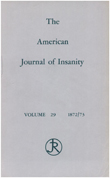Double-blind, placebo-controlled, crossover trial of inositol treatment for panic disorder
Abstract
OBJECTIVE: Because they found in an earlier study that inositol, an important intracellular second-messenger precursor, was effective against depression in open and double-blind trials, the authors studied its effectiveness against panic disorder. METHOD: Twenty-one patients with panic disorder with or without agoraphobia completed a double- blind, placebo-controlled, 4-week, random-assignment crossover treatment trial of 12 g/day of inositol. RESULTS: The frequency and severity of panic attacks and the severity of agoraphobia declined significantly more after inositol than after placebo administration. Side effects were minimal. CONCLUSIONS: The authors conclude that inositol's efficacy, the absence of significant side effects, and the fact that inositol is a natural component of the human diet make it a potentially attractive therapeutic for panic disorder.
Access content
To read the fulltext, please use one of the options below to sign in or purchase access.- Personal login
- Institutional Login
- Sign in via OpenAthens
- Register for access
-
Please login/register if you wish to pair your device and check access availability.
Not a subscriber?
PsychiatryOnline subscription options offer access to the DSM-5 library, books, journals, CME, and patient resources. This all-in-one virtual library provides psychiatrists and mental health professionals with key resources for diagnosis, treatment, research, and professional development.
Need more help? PsychiatryOnline Customer Service may be reached by emailing [email protected] or by calling 800-368-5777 (in the U.S.) or 703-907-7322 (outside the U.S.).



